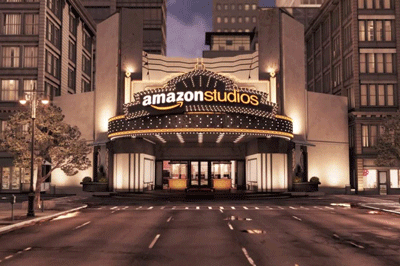Center director Jeffrey Cole explores how the entertainment industry will change as new players from Silicon Valley and elsewhere enter the business.
______________________________
By Jeffrey Cole
“How do you become a millionaire in Hollywood?” asks one of the great fables of the entertainment industry. The answer is simple: “You start out as a billionaire.”
 For generations, real estate magnates, oil tycoons, and other exceedingly rich people have been attracted to the excitement of Hollywood and have invested to become studio owners. The perks are obvious and much better than their fellow oil or real estate tycoons will ever see: a very glamorous business with access to the best parties, the biggest stars, good seats at the Oscars, and great bragging rights.
For generations, real estate magnates, oil tycoons, and other exceedingly rich people have been attracted to the excitement of Hollywood and have invested to become studio owners. The perks are obvious and much better than their fellow oil or real estate tycoons will ever see: a very glamorous business with access to the best parties, the biggest stars, good seats at the Oscars, and great bragging rights.
Even some of the world’s biggest companies — whether they sell soft drinks, electronics, alcohol, or something else — have succumbed to the poor business sense and high glamour of entertainment. Most get out fairly quickly with their balance sheets and pride somewhat wounded.
Making a $250 million movie and watching it crash and burn in one weekend is not for the faint of heart.
The Japanese (Sony and Matsushita-Panasonic), the Canadians (Seagram’s), and the French (Vivendi) have had a go at entertainment. Only Sony has stayed for the long run. Now the Chinese may take a chance as they circle some of the biggest studios as possible owners.
In the past year, it became clear that Apple, Facebook and Google are also taking a hard look at the Hollywood studios. Acquiring almost any one of them would barely make a dent in their corporate coffers. Assuming the AT&T-Time Warner deal and the Disney-Fox sale go through, those two companies will join NBC Universal Comcast as beefed-up entertainment giants.* After the dust settles, Sony and Paramount-Viacom seem easy targets for the Chinese or Silicon Valley.
All of this brings us to Amazon. The online retail giant could have bought just about any of the Hollywood studios. The most valuable of the six is less than 25 percent the size of Amazon.
Why did Amazon decide to build its own studio rather than sweep in and buy an established brand?
_________________________________________________________________________________________________
Amazon had one other enormous advantage over not just the studios and networks but also over all the other streaming services: people felt that Amazon Prime Video was “free.” Of course it isn’t free: Amazon Prime will soon cost $119 a year. But the Center’s work shows that almost everyone buys Amazon Prime for the shipping benefits. Satisfaction with Prime is at an all-time high and has become an essential part of most households. They see Prime Video as an added benefit rather than its own expense. In a sense, Netflix’s $10.99 a month is competing with Amazon’s free.
_________________________________________________________________________________________________
When Jeff Bezos wanted the Washington Post, he bought it outright for $250 million. He acquired it personally rather than buying it through Amazon. At the time, he spent a quarter of a billion dollars for the Post he was worth $25 billion, so the Post represented one percent of his total net worth. The intervening years have been good to Bezos. Today the price of the Post represents 2/10 of one percent of his total worth.
When Bezos wanted to make a beachhead in the media world, he bought one of the best brand names in the news business. He could have easily done the same in the entertainment business, yet he decided to build his own brand. Any of the major studios could have been consumed into the Amazon empire without even a noticeable bulge as it was digested.
The truth of the new era of brand and technology is that Amazon didn’t need the cachet of an industry leader. There is nothing a major studio can do that Amazon cannot do better and at far less cost.
Amazon understood that they could create a new playbook for entertainment as they did in retail and for the book business The company recognized that there was a tremendous pool of creative and business talent that would flock to the large budgets, creative freedom and new rules as one of the world’s biggest companies moved into entertainment. Quickly, they saw they could rent whatever studio space they needed (why own it?) with their content partners.
The most important lesson was another Hollywood tenet, “Content is king.” Or, as we at the Center say in the new era of over-the-top (OTT), “Content is kinger than ever.” Forget space and everything else, all they needed was great content.
Streaming meant no network sales force to sell advertising and no worldwide distribution team to book content into theaters. Netflix already showed how easy it was to compete with major networks and studios. OTT meant no local stations or movie theaters to deal with.
All you needed was large amounts of funding to attract the best content and talent.
Funding was one thing Amazon had plenty of, and large Hollywood budgets were small in Amazonian terms. Quickly, they were able to get access to the best scripts and talent. Within a year, Amazon won Emmys with Transparent and Mozart in the Jungle, as well as an Oscar for Manchester by the Sea. They bought the huge television hit Top Gear from the British and signed Woody Allen to a television deal– a medium he had not worked in for over 40 years.
All this talent was attracted to the new rules of entertainment: Amazon didn’t have to cater to advertisers and therefore could be freer than almost all television. This gave them the freedom to appeal to underserved parts of the television audience such as the very young and those over 50.
Ratings were not part of the equation either. The measure of success for Amazon and Netflix was not whether an individual film or television program was successful, but instead whether subscribers renewed the service at the end of its term. Executives — whose careers could be made or broken by overnight ratings delivered each morning — could wake up without terror that they could be out of a job. The pressure was still there, but not every day.
_________________________________________________________________________________________________
Amazon understood that they could create a new playbook for entertainment as they did in retail and for the book business The company recognized that there was a tremendous pool of creative and business talent that would flock to the large budgets, creative freedom and new rules as one of the world’s biggest companies moved into entertainment. Quickly, they saw they could rent whatever studio space they needed (why own it?) with their content partners.
_________________________________________________________________________________________________
The new rules meant that the lines between television and film could be completely blurred, if not eliminated. The biggest stars would eagerly flock to 10-hour series with high budgets rather than the oppressive schedules of 22 episodes a year. The 10 episodes didn’t even have to be every year (for example, Curb Your Enthusiasm on HBO).
Speaking of schedules, the new players didn’t have to program full-time linear schedules or release 10 to 14 films a year. If they only had eight great films, they could stop there. Or, if they got 20, they could expand. Freed from a binding relationship with movie theaters, Amazon could put films in the theaters and then move them to television 30 days later.
Amazon had one other enormous advantage over not just the studios and networks but also over all the other streaming services: people felt that Amazon Prime Video was “free.” Of course it isn’t free: Amazon Prime will soon cost $119 a year. But the Center’s work shows that almost everyone buys Amazon Prime for the shipping benefits. Satisfaction with Prime is at an all-time high and has become an essential part of most households. They see Prime Video as an added benefit rather than its own expense. In a sense Netflix’s $10.99 a month is competing with Amazon’s free.
Bezos was right (as usual): there was little to gain from buying Warner Bros. or Paramount. He would acquire a lot of overhead and people who played by the old rules. What really attracts talent (as well as audiences) is great content. It takes money to make great content, and Amazon was willing to spend it. All the money went directly to the content.
All this raises the question as to why AT&T wants Time-Warner or why Disney and Comcast want Fox? It also raises another question: if Bezos could start his own media company, then why didn’t he create a new news service rather than buying the Washington Post?
I think the answer is clear: Bezos didn’t see the Washington Post as an investment. Rather he saw it as a public service. He knew and liked the owner Donald Graham and wanted to save the legendary newspaper from a certain demise. He bought the paper for all the right reasons and has heavily invested in it to make it a better newspaper than ever.
One of the many advantages of being the richest man in the world is that not everything has to make business sense.
__________
* As of this writing, Comcast is about to make an all-cash offer for the Fox assets that Rupert Murdoch wants to sell to Disney. Assuming Comcast wants to be more than a spoiler and gets those assets, the company will become even bigger.
________

Jeffrey Cole is the founder and director of The Center for the Digital Future at USC Annenberg.
See all columns from the Center.
June 6, 2018

